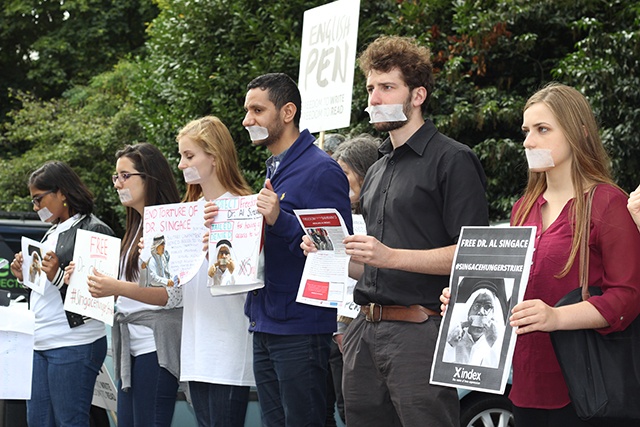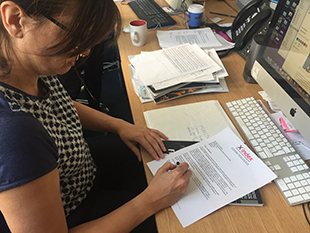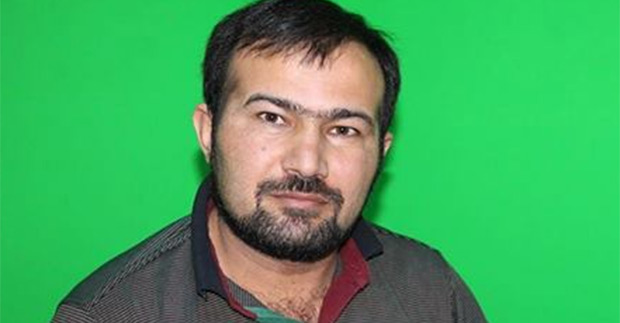17 Aug 2016 | Campaigns, Campaigns -- Featured, Statements, United Kingdom
On Tuesday, the UK learned that radical cleric Anjem Choudary had been convicted under Section 12 of the UK’s 2000 Terrorism Act, which makes it a crime to invite “support for a proscribed organisation”. Choudary had long argued that, in advocating his support for the creation of an Islamic state and the imposition of sharia law, he was simply exercising his right to free speech. And this was true. Like any other citizen, Choudary should be allowed to express his political views, no matter how vile or abhorrent.
But there is also no doubt that Choudary trod a very careful and deliberate line. Choudary understands that in a free and democratic society (the kind to which Choudary would like to see a violent end), the only occasions on which free speech should be curtailed is when the speech provokes – or presents a clear and imminent danger of provoking – violence. Beyond that line, no one, including Choudary, should be prevented from expressing their view.
If free speech is to mean anything, then free speech rights must apply equally.
|
The immediate question, then, is whether Choudary was advocating violence? In Index’s view, he was. Choudary was convicted of encouraging followers to join IS, a proscribed terrorist organisation. Although he did not directly incite violence, he was calling on others to join a group whose avowed aims are victory through violence. In this context, the definition of a proscribed group becomes crucial. Proscribed groups should only be ones that directly use and incite violence, not simply political parties whose views do not chime with those of the government or even the majority of the population. This is a vital line.
If free speech is to mean anything, then free speech rights must apply equally: as much to those whose views we abhor as to those whom we support. Choudary deliberately exploited liberal values to advocate wholly illiberal ones. So it is critical that in responding to the likes of Choudary that we do not respond by shifting further towards the kind of illiberal society he favours. The laws which (should) protect Choudary’s right to envisage the imposition of an Islamic state are the same that protect the rights of the rest of us to voice our opposition: the best way to dispute views you disagree with is openly, rather than driving them underground where they can grow.
Index is concerned at the current direction of travel in anti-extremism law and its damaging implications for free speech. New leglisation is currently under consideration that would target those who advocate extremist views but do not directly encourage violence. This could include banning orders that would prevent non-violent extremists from speaking or publishing – a move that risks undermining the democratic judicial process, as David Anderson, the independent reviewer of terrorism legislation told BBC’s Today programme.
This is a dangerous road to go down. The definition of terrorism is already contentious and further defining ‘non-violent’ extremism almost impossible. Indeed, Christian groups have already expressed concern that the proposed new law would, for example, prevent an opponent of gay marriage from expressing such a view. Nor should we use the examples of Choudary’s use of social media to greenlight enforcing social media companies to act as arms of the law, making decisions about content removal that should be made by courts.
Across the world, Index defends the rights of those who express views their government deems ‘extremist’. Choudary is an extremist. His views are repugnant and to be countered at every opportunity, but he should be allowed to express them.
More information about UK law and counter terrorism
17 Aug 2016 | Academic Freedom, Bahrain, Campaigns -- Featured, Middle East and North Africa, mobile, News and features

Protesters in London demand the release of Abduljalil al-Singace, July 2015.
One year has passed since Index on Censorship magazine editor Rachael Jolley sent a copy of the publication – Fired, Threatened, Imprisoned… Is Academic Freedom Being Eroded? – to jailed Bahraini academic, human rights activist and writer Abduljalil al-Singace to mark his 150 days on hunger strike.
Al-Singace’s hunger strike ended on 27 January 2016 after 313 days, but he remains in prison.
In a letter accompanying the magazine, Jolley aired concerns that al-Singace – who had been protesting prison conditions while being held in solitary confinement – had suffered torture and called on the Bahraini authorities to ensure he “had access to the medical treatment he urgently requires”.

Index magazine editor Rachael Jolley pens letter to Bahrain’s Ministry of Interior regarding al-Singace, 17 August 2015.
On 15 March 2011 Bahrain’s king brought in a three-month state of emergency, which included the through establishing of military courts known as National Safety Courts. The aim of the decree was to quell a series of demonstrations that began following a deadly night raid on 17 February 2011 against protesters at the Pearl Roundabout in Manama, when four people were killed and around 300 injured.
Over 300 individuals were subsequently convicted through National Safety Courts, often for speaking out against the government or exercising their right to assemble freely. Many were punished simply for supporting or being part of the country’s opposition movement.
On a midnight raid at his home on 17 March 2011, al-Singace was arrested at gunpoint. During the arrest, he was beaten, verbally abused and his family threatened with rape. Disabled since his youth, al-Singace was forced to stand without his crutches for long periods of time during his arrest. Masked men also kicked him until he collapsed. The Bahraini authorities placed him in solitary confinement for two months. During this time the guards starved him, beat him and sexually abused him.
Al-Singace is part of what is known as the Bahrain 13, a group of peaceful activists and human rights defenders imprisoned in Bahrain in connection with their role in the February 2011 protests.
On 22 June 2011 a military court sentenced all members of the Bahrain 13 to between five years and life in prison, on trumped-up charges of attempting to overthrow the regime, “broadcasting false news and rumours” and “inciting demonstrations”.
Evidence used against them was extracted under torture, but this didn’t prevent their sentences being upheld on appeal in September 2011, at a civilian court in May 2012 and in January 2013 at the Court of Cassation. The Bahrain 13 has now exhausted all domestic remedies and are currently serving their sentences Jau prison, notorious for torture and ill treatment.
During their arrest and detention, the Bahrain 13 were subject to beatings, torture, sexual abuse and threats of violence and rape towards themselves and members of their family by police and prison authorities. Eleven of the 13 remain in prison.
The group consists of:
Al-Singace
Sheikh Abduljalil al-Muqdad, a religious cleric and a co-founder of the al-Wafaa Political Society. During his detention he has been beaten, tortured and told his wife would be raped.
Abdulhadi al-Khawaja, a human rights activist and co-founder of the Bahrain Center for Human Rights. On 8 February 2012, he began a hunger strike to protest his wrongful detention and treatment in prison. He ended his hunger strike after 110 days on 30 May 2012. He went on hunger strike again in April 2015 to protest against the torture of prisoners at Jau.
Salah al-Khawaja, a prominent human rights activist, marriage consultant and the brother of Abdulhadi. The government previously arrested Salah in the 1980’s and 1990’s for engaging in political activity against the government. He was released on 19 March 2016.
Abdulhadi al-Makhdour, a religious cleric and political activist. Authorities prevented him from showering and performing his daily prayers. They spat in his mouth and forced him to swallow. They also denied him access to a lawyer and barred him from contacting his family.
Mohammed Habib al-Muqdad, a religious cleric and the president of the al-Zahraa Society for Orphans. During his time in prison he was sexually assaulted with sticks and forced to gargle his own urine. Security guards also electrocuted him on his body and genitals.
Mohammed Ali Ismael, a prominent political activist in Bahrain. During his imprisonment, he has been beaten and verbally abused.
Abdulwahab Hussain, a life-long political activist and leader of the Al Wafaa political opposition society. He was previously detained for six months in 1995 and for five years between 1996 and 2001. He was diagnosed with multiple peripheral polyradiculoneuropathy, a condition which affects the body’s nerves, in 2005 and suffers from sickle-cell disease and chronic anaemia. His health conditions have worsened as a direct result of the torture and ill-treatment, while medicine and treatment have been denied to him. During his current sentence he has contracted numerous infections.
Mohammed Hassan Jawad, human rights activist who campaigns for the rights of detainees and prisoners who has been jailed a number of times since the 1980s. During his current imprisonment, he was electrocuted and beaten with a hose.
Sheikh Mirza al-Mahroos, a religious cleric, a social worker, and the vice-president of the al-Zahraa Society for Orphans. During his time in prison, Al-Mahroos has been denied medical treatment for severe pain in his legs and stomach. Despite having the proper documentation, he was not permitted to visit his sick wife, who later died in early 2014.
Hassan Mushaima, a political activist and leader of the Al Haq opposition society in Bahrain who has been arrested several times for his pro-democratic activities. He was diagnosed with lung cancer in 2010, which he was successfully treating at the time of his arrest. Medical results have been denied to him in prison.
Sheikh Saeed al-Noori, a religious cleric and member of the al-Wafaa Political Society. During his detention he has been tortured, forced to stand for long periods of time and had shoes stuffed in his mouth.
Ebrahim Sharif, the former president of the National Democratic Action Society. He is a political activist and has campaigned for democratic reform and equal rights. On 19 June 2015, Sharif was released following a royal pardon, only to be rearrested on 12 July 2015. He was charged with “inciting hatred against the regime” for a speech he delivered in commemoration of 16-year-old Hussam al-Haddad, who was shot and killed by police forces in 2012. He was released again in July 2016 and remains out of prison but the Bahrain Institute for Rights and Democracy he is at risk of being arrested again because of an appeal by prosecutors.
Source: The Bahrain Institute for Rights and Democracy.
Also read:
– Bahrain continues to use arbitrary detention as a weapon to silence critics
– Bahrain: critics and dissidents still face twin threat of statelessness and deportation
16 Aug 2016 | Campaigns, Campaigns -- Featured, mobile, Statements, Turkey, Turkey Statements
Index strongly condemns the indefinite closure of newspaper Özgür Gündem by a Turkish court.
The silencing — even temporarily — of one of Turkey’s last independent papers underscores the severe erosion of freedom of expression in the country. This crackdown on critical voices has accelerated since the attempt to overthrow the country’s democratically elected and increasingly autocratic president Recep Tayyip Erdogan.
|
The silencing — even temporarily — of one of Turkey’s last independent papers underscores the severe erosion of freedom of expression in the country.
|
|
“Waves of arrests rippling across the country have swept up journalists, academics and even artists and are rightly raising concerns around the world. This latest attack on media freedom sends a clear signal that president Erdogan is intent on playing politics with the public’s right to information and journalists’ right to report,” Index on Censorship CEO Jodie Ginsberg said.
Özgür Gündem, a paper that gives voice to the country’s Kurdish minority, has — along with other outlets — been the target of restrictive government policies. In May, officials used a paper-sponsored solidarity campaign to target journalists and editors that participated to stifle any criticism of the government’s renewed fight with armed factions affiliated with the Kurdistan Workers’ Party (PKK). The resulting investigation saw journalists interrogated and detained for articles that the government said were spreading “terrorist propaganda”.
As part of its post-coup purge, the government has targeted at least 70,000 people, who are accused of ties to the Gulenist movement that President Erdogan says is behind the failed assault. In addition, 151 media outlets have been closed and at least 77 journalists have been detained, making Turkey the largest jailer of reporters in the world.
“Index’s Mapping Media Freedom project has been monitoring the grim toll the post-coup purge is having on Turkey’s media freedom. In the month since the failed coup, there have been 61 verified and serious threats to press freedom. In contrast, the other 41 counties monitored by the project accounted for 51 reports,” Hannah Machlin, Mapping Media Freedom project officer said.
16 Aug 2016 | Azerbaijan, Azerbaijan News, Europe and Central Asia, Mapping Media Freedom, mobile, News and features

Azadliq journalist Seymur Hezi was arrested in August 2014. He was subsequently convicted of aggravated hooliganism and sentenced to five years in prison.
Azerbaijan has never had a strong record on press freedom. Since independence, the country’s journalists have been mistreated, while independent and opposition newspapers faced constant libel charges and other harassment from local law enforcement or criminal elements.
Journalists and outlets that support government policies are left alone to fill their pages with praise, while those who take a more critical approach are punished. Official court documents detail how journalists have been sent to prison on trumped-up charges of hooliganism, extortion, trafficking, and instigating mass protests and violence.
In practice, however, targeted journalists reported on official corruption, criticised extravagant government spending or documented illegal evictions. While the country’s leaders and key decision makers pay lip service to media freedom, the government continues to hunt down journalists, activists and human rights defenders.
Periodic waves of arrests have created a sense of fear that has suffocated the country’s journalists. Independent media — like Index award-winning Azadliq — have been pushed into bankruptcy through the withholding of funds and spurious libel litigation. Even media organisations based outside the country — like meydan.tv — have been subject to harassment and punitive investigations. Azerbaijan’s small but remaining mass of independent voices is shrinking.
The timeline, beginning in 2003, includes journalists and bloggers who have been arrested and sentenced on bogus charges.
TimelineJS Embed



